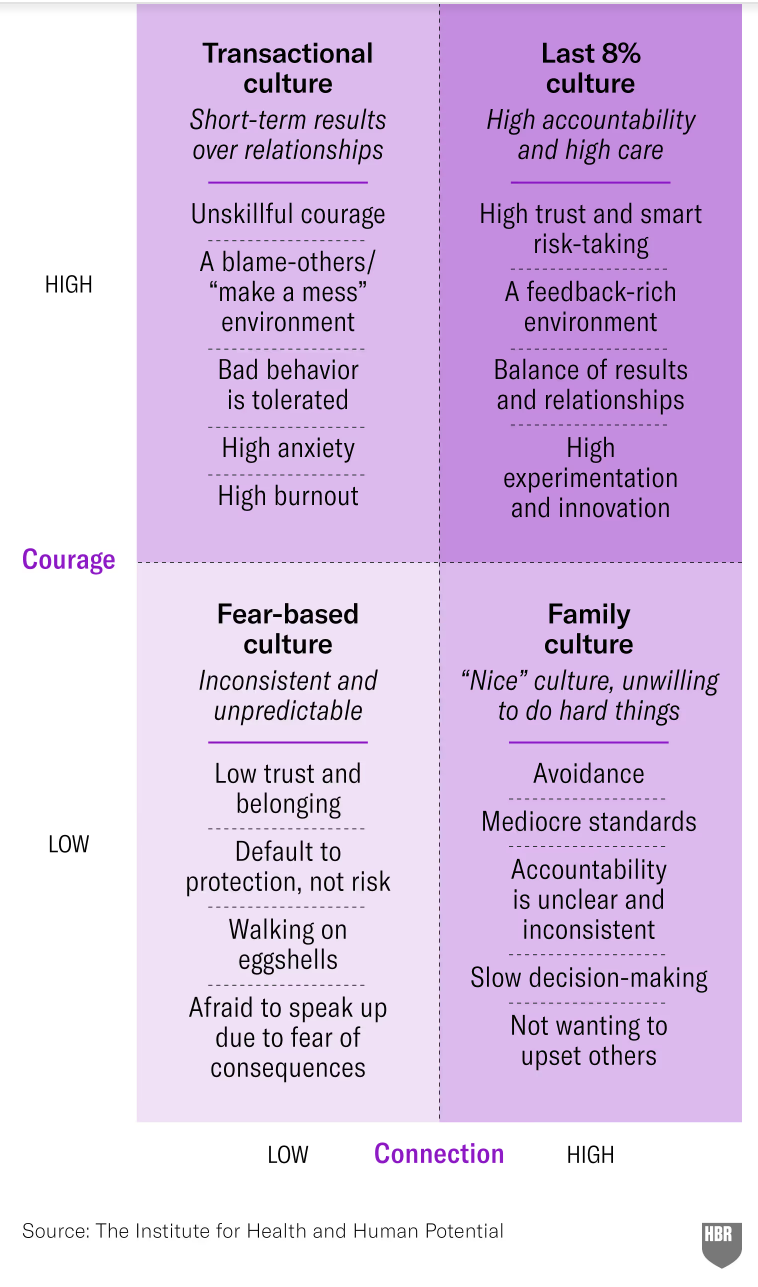The Last 8% - High Performing Teams
I read an article by JP Pawliw about creating an organization of high performers. Check out the article here: https://hbr.org/2025/09/the-secret-to-building-a-high-performing-team.
The article points to a multi-year survey of 34,000 people which says that employees are comfortable enough discussing 92% of what they want to say. The last 8% is what they leave out, which may be just the thing that needs to be talked about to bring the org into the realm of 'high-performance'. It's the same with risk taking, and with difficult decisions that managers are not comfortable making because of fear.
The article suggests that two organizational virtues are needed as part of the culture. The first is courage, and the second is connection. Basically if the culture is encouraged and rewarded for taking risks, and if everyone feels a sense of togetherness and interdependence, then the culture of "the last 8%" can be attained. They talk about features like high accountability, high care, high trust, smart risk-taking, feedback-rich, balance of results and relationships, high innovation, etc. Sounds great - who doesn't want to be part of a team like that?
I really liked the 4-quadrant graph they made.

This reminds me of Angela Duckworth's wisdom from her book Grit (notes from Heroic). Here's a quick quote from Grit:
“Why were the highly accomplished so dogged in their pursuits? For most, there was no realistic expectation of ever catching up to their ambitions. In their own eyes, they were never good enough. They were the opposite of complacent. And yet, in a very real sense, they were satisfied with being unsatisfied. Each was chasing something of unparalleled interest and importance, and it was the chase—as much as the capture—that was gratifying. Even if some of the things they had to do were boring, or frustrating, or even painful, they wouldn’t dream of giving up. Their passion was enduring.
In sum, no matter the domain, the highly successful had a kind of ferocious determination that played out in two ways. First, these exemplars were unusually resilient and hardworking. Second, they knew in a very, very deep way what it was they wanted. They not only had determination, they had direction.
It was this combination of passion and perseverance that made high achievers special. In a word, they had grit.”
She talks about how effective parents use high warmth, and high standards. That combination helps bring out the best in our kids. It's the personalized version of organizational courage and connection. If we want to instill a culture of "the last 8%" in our teams, then we should take accountability and commit ourselves as leaders to being warm, present, connected, and sympathetic while also holding those we serve to high standards, giving timely feedback, and having the hard conversations. Pointing out when things just aren't stacking up the right way and where we have gaps. Not in a condescending or damning way, but with our team's best interests at heart and coming with a plan to reconcile the gaps. As organizational strategy consultant Jerry MacNamera says, we need to give our people the 5 T's of execution. They need time, training, tools, talent and tenacity. If our people have each, they can go forward and execute their best work. Jerry suggests in this article on tenacity that
"Grit is a lie we’ve been sold. People don’t persist because they’re tougher. They persist because their systems are stronger. Two entrepreneurs can face the same failures, and one will keep going while the other quits. The difference isn’t grit. It’s what I call Engineered Tenacity"
What about you? How is your team culture? Do you feel comfortable saying all 100% of the things on your mind? Does your team? And how can you bring a little more warmth and high standards, to create a culture of courage and connection? How can you engineer a little more tenacity into your life?
